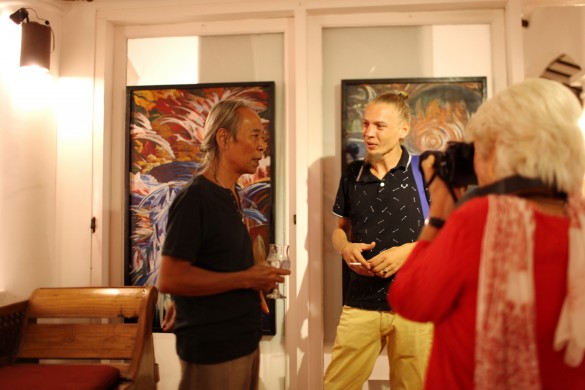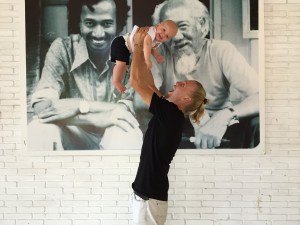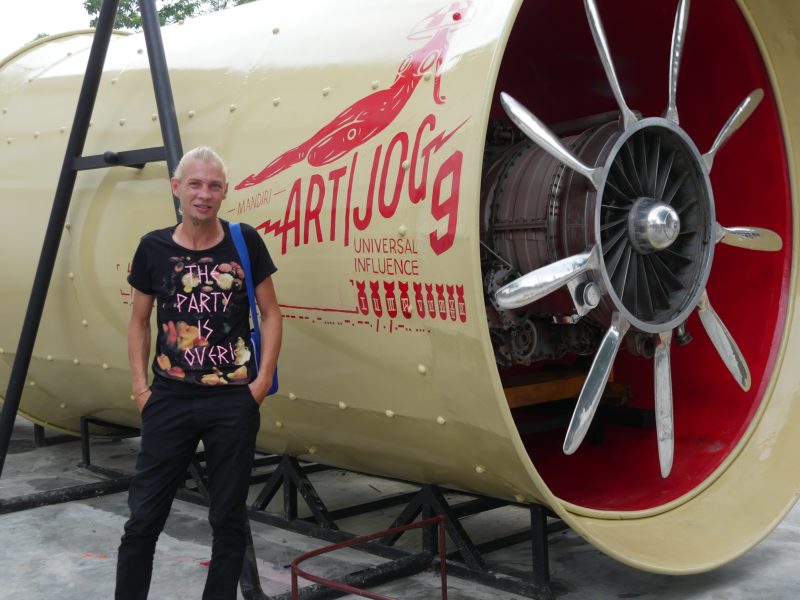Vladimir Karpov came to Bali for an Indonesian marketing agency and decided to stay. He has been involved in promoting the arts of Indonesia on an international and local level for almost a decade.
Where did you spend your early years?
I was born and raised in Kazakhstan, on the northern slopes of the Himalayan Mountains and still a formal republic of the Soviet Union at that time. When the USSR fell apart, I was ten years old and my mom, along with a few friends, decided to move to St. Petersburg, Russia. My father stayed in Kazakhstan.
We lived out of the city in a country house of which I have many happy childhood memories. There were several families, and as children, we played in the snow among the lakes and in the sunflower fields. We explored huge abandoned farm buildings. It was a beautiful childhood full of adventure and a natural environment that encouraged creativity.
In my teens, I travelled regularly between Russia and Kazakhstan where my father remained. I also lived in the United States. During my boyhood, I was exposed to a great deal of cultural diversity that I appreciate to this day.
I attended university in St. Petersburg, where I studied marketing and public relations, and always had a passion for the arts and culture. My graduate work was about branding museums, and it was implemented in rebranding one of the state museums: The Museum of the History of Religion. I found ways to put my marketing skills into social and cultural directions that I continue to do in my work even to this day.
How did you come to Bali?
I came to Bali totally by coincidence. I had never thought I’d come here until I went on a cruise to some islands around St. Petersburg and met an Indonesian woman, Kora Amalwati.
Kora had a well-known marketing solutions agency in Sanur, Bali. I was already working in a good position with an agency in St. Petersburg. When she offered me a job, I had never heard or known anything about Bali. This was 2008, the year of the world economic crises. It affected the business I worked in so after some time I called her. She asked me to come as soon as possible to join the current project her firm was working on. Two days later I was in Bali.
I worked for Kora’s firm for one year, then I returned to Russia and Kazakhstan. I was back here in just six months. I knew that Bali was the place where I wanted to be and marketing Indonesian art was what I truly wanted to do. I returned and have been living here ever since.
How did Bali change your life?
Bali is amazing. It is full of all the things I love – art, culture, strong spiritual traditions and a growing contemporary awareness, including the arts. Bali really changed my life. I went through deep transformations here. I have learned to cherish what is truly valuable in life. I have become a husband and a father – and love being both.
Art has always been my passion. Art is such an important part of the Balinese way of life. They have great respect for art and artists, which is hard to find elsewhere. It is a part of their lives. All the traditional arts are intertwined around their rich belief system. Just making the simple offerings is an art.

Artists here must study all aspects of their art. A dancer may also carve the masks and know the words to the play that is a part of their religious legends. Everything is connected.
Artists learn like in the times of Da Vinci and the Renaissance, by apprenticing and working with accomplished traditional artists. The contemporary artists still are influenced by tradition. Bali has shown me how life and art and the spiritual aspects of life are all connected as one.
Is Indonesian art appreciated internationally?
Indonesian art, both traditional and contemporary, is a cultural time bomb waiting to go off. Indonesia in the arts is like El Dorado: it is an undiscovered global arts centre.
There is a cultural evolution taking place in art and design here. Indonesians are becoming more aware of their rich art heritage and are investing in traditional, as well as contemporary works and projects in new and emerging media. The people of Indonesia share a cultural heritage that goes back to the animist arts. Designers, artists and media innovators are now gaining international recognition. It has just begun.
What have you been working on recently?
My focus as a curator and as an artist producer has been primarily on emerging Indonesian artists, with some Central Asian and Russian artists. I bring artists and collectors from Central Asia and Russia here to Bali. I introduce them to a whole new world – the arts and culture of Bali and throughout all of Indonesia.
I emphasize to my guests the unique diversity and mutual influences only possible in this archipelago with its rich and ancient history of commerce and the arts. I expose them to the ‘primitive’ art traditions of Indonesia’s past that influenced the modern art movement of the West in the mid-twentieth century.
I introduce contemporary artists to traditional artisans and crafts people, and by working together, more art is created. I advise young contemporary artists on how to best present their works and on how the traditional artists can benefit through modern presentations for a broader market appeal.
I do pop-up art shows and exhibitions under the name “Unknown Art Space” with different groups of artists in eclectic presentations as the contemporary, modern and traditional artworks complement each other.
I currently organize and advise clients. I provide consultation on interior design as well, and in doing so, I try to support traditional ways of production. I often go to villages that specialize in authentic traditional crafts and put it in the art shops with a modern presentation. The name of this project is “Talisman”.
There are many villas continuously being built that help create a large growing market for art and unique interiors. I encourage and integrate Indonesian arts globally in a different and unique way. There is more mixed media and recycled art every day, and these contemporary artists are gaining recognition in the global arts world. Artists today are becoming an important part of society in finding solutions commercially and environmentally.
Artists are used in think tanks, and major corporations invite artists for feedback and advice on products, from design consulting to creating sustainability. Indonesia is going through a renaissance as commerce and creativity drive it forward to emerge as a major player on the global stage. The next ten years will bring a boom in sales and recognition to this country.
I support forms of environmental art where waste becomes a viable product. I strive to encourage an understanding of underground and street art on a higher level with fine art. The traditions of art run deep in Indonesian culture, especially in Bali. We can find solutions to global problems if we think positively and creatively. There is a consciousness rising here that will create a lot of positive changes. 
What makes you happy?
Happiness is my son, my wife, my family and my friends. Feeling inspiration through nature, the arts and laughter all make me happy. I love fairytales and dark humour.
What makes you sad?
War and violence. People waste so much energy on these things instead of creating new cultural adventures like building and exploring new depths of our planet and our very consciousness. Through sadness and dark times come beauty and happiness.
Vladimir can be contacted through his email: [email protected]




